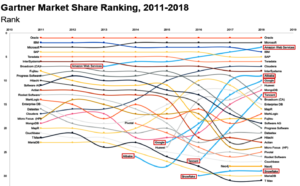
Cloud Now Default Platform for Databases, Gartner Says

Deploying a database to the cloud? You’re not alone, according to Gartner, which says rapid growth in cloud deployments of databases over the past two years have turned clouds into the default modality and relegated on-premise database deployments to legacy status.
The overall database management system (DBMS) market grew at 18.4% from 2017 to 2018, which was the best yearly gain in over a decade, Gartner said in a recent report. Cloud DBMS accounted for 68% of that growth, Gartner said, and most of that database cloud growth came from two just vendors: Amazon Web Services and Microsoft Azure.
DBMS cloud services accounted for $10.4 billion of the $46.1 billion DBMS market in 2018, according to Gartner. That figure does not include hosting DBMS licenses in the cloud, it said. Much of the innovation around databases development is occurring in a cloud-first or cloud-only manner, according to Gartner, which said that most of the inquiries the company gets about DBMS revolve around the cloud and migrating to cloud platforms.
“The message in our research is simple – on-premises is the new legacy,” wrote Gartner analysts Adam Ronthal, Merv Adrian, and Donald Feinberg in a blog post this week. “Cloud is the future. All organizations, big and small, will be using the cloud in increasing amounts.”
Organizations that want to take advantage of the latest database innovation are moving to the cloud, the analysts wrote. In fact, there is an increasing amount of innovation that will never get to on-premises, even when the vendor has on-premises products, he wrote.
“On-premises is the past, and only legacy compatibility or special requirements should keep you there,” the analysts wrote. “Some might think we are early; others might think we are late, and some may even think us crazy!”
The June 20 report, titled “The Future of Database Management Systems is Cloud, found that Oracle and Microsoft remained the number one and number two vendors, respectively, when it comes to DBMSs. Relational databases still dominate the rankings, and vendors are moving aggressively to support RDBMSs in the cloud, as evidenced with Oracle launch today of Autonomous Database Dedicated, a new private database service that’s available in the Oracle public cloud.
AWS, which sells relational, NoSQL, graph, and time-series databases (among others), displaced IBM and its relational Db2 database from the number three slot, which Big Blue had held for the past five years. Cloud vendors Alibaba, Google, Tencent, and Snowflake – all of which debuted database services within the past five years – all demonstrated remarkable growth in Gartner’s ranking.
Other DBMS vendors demonstrating positive growth include Hadoop distributor Cloudera, which moved from the 17th spot in 2011 to become the 7th most popular database in 2018, according to Gartner’s rankings. NoSQL database maker MongoDB moved from the 19th spot in 2011 to number 12.
MapR Technologies, which includes a NoSQL database with its Hadoop distribution, quickly rose through the charts and became the 10th most popular database in 2016, but has since fallen to number 16. Datastax and Couchbase, both of which offer NoSQL databases as well as cloud services, have generally trended downward, losing five and six spots, respectively, over the past eight years, according to Gartner’s rankings.
Related Items:
As Cloud Grows, Is Resistance to AWS Futile?
Google Cloud Unveils Slew of New Data Management and Analytics Services
DataStax Unveils Constellation, Its Cassandra Cloud Platform
































